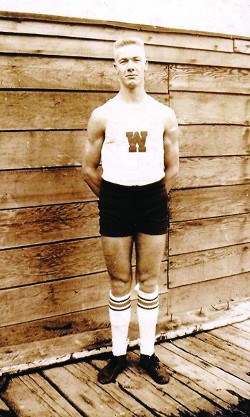There’s a profound inspiration that emerges from sports movies centered around an underdog team, tapping into deep emotions within their audience. ‘The Boys in the Boat’ not only captures this emotional resonance but delves even further by unfolding against the backdrop of the years leading up to World War II. The story revolves around the University of Washington’s rowing team and their remarkable journey to compete in the 1936 Berlin Olympics. Directed by George Clooney, the film’s historical setting and powerful storyline naturally prompt questions about its authenticity and whether it is based on a true story or not.
The True Story that Inspired The Boys in the Boat
Yes, ‘The Boys in the Boat’ is indeed based on a true story, drawing inspiration from the 2013 bestselling non-fiction book of the same name written by Daniel James Brown. The incredible real-life narrative saw the light of day when Brown’s neighbor, Judy Rantz-Wilman, approached him. In her mid-60s, Judy shared that her father, Joe Rantz, had been reading Brown’s work and expressed a desire to meet him. This encounter led to Brown meeting Joe Rantz, who became a central figure in Brown’s book, chronicling his journey from a young man living through the Great Depression to a member of the University of Washington’s rowing team that not only reached the 1936 Summer Olympics but also emerged victorious.

Rantz and Brown kept talking for a while. When Rantz passed away in 2007, Brown worked with Judy, who had grown up listening to these stories. After Rantz passed away, Judy gave him some audio tapes that she had recorded of her conversations with her father and Brown used it as his source material. George Clooney expressed his admiration for the book, stating that he was already a big fan and was hoping to get the rights and other formalities done so he could jump onto the project. He felt it was a story he could convey honestly. Talking about it, he told Deadline, “I grew up in a small town in Kentucky, my father and mother are Depression-era kids. They talked about what it was like, three people sharing a bed and all that stuff.”
Clooney added, “The idea of pulling yourself up by your bootstraps is a really nice idea unless you don’t have bootstraps. That was how our kids in the Depression had it.” Recognizing the challenge of condensing such a rich and intense story into a two-hour film, he emphasized the importance of capturing the spirit of the book, especially that of Joe Rantz, and despite the difficulties, he felt that he had been able to achieve that. Born on March 31, 1914, in Spokane, Washington, Joe Rantz faced adversity early in life when he lost his mother to throat cancer at the age of 4. As his father, Harry, remarried, Joe found himself at odds with his stepmother Thula, who reportedly harbored little affection for him.

Abandoned by his family around the age of 13, Joe swam through the challenges of adolescence alone. When his elder brother summoned him to Washington, Joe’s relentless determination earned him a coveted spot at the University of Washington. At college, Coach Al Ulbrickson formed a rowing team and he recognized Joe’s prowess and welcomed him into the world of competitive rowing. Hailing from lower-class or lower-middle-class backgrounds deeply impacted by the hardships of the Great Depression, the boys on the team carried the weight of their era’s challenges. Born into an era defined by economic struggles, these young men bore witness to the consequences of societal upheaval.
Against this backdrop, the underdog team achieved a remarkable feat by triumphing over the wealthy boys from the East Coast at the 1936 Intercollegiate Rowing Association Regatta and earning the honor of representing the country at the Summer Olympic Games in Berlin. The 1936 Olympics, hosted in Berlin, unfolded as a grand spectacle manipulated by Adolf Hitler to propagate Nazi propaganda and promote anti-Semitic ideologies rooted in racial supremacy. Hitler aimed to showcase Aryan superiority, using the Games as a platform to reinforce his political agenda.
Germany excelled across various sports that year, with notable achievements in track and field, boxing, and gymnastics. The US rowing team made it to the finale and found themselves facing the formidable German team. This athletic confrontation symbolized the broader political context of the time, with the US grappling with the lingering effects of the 1920s financial crisis, while Germany thrived, projecting an image of defiance and pride on the international stage. The race became a microcosm of the ideological tensions between the two nations during this tumultuous period in history.
The US rowing team clinched victory using their distinctive tactic — initially starting slow and then executing a powerful sprint. Hitler witnessed this triumph, an event the film beautifully portrays. During that era, rowing held immense popularity, and the team’s win resonated deeply with the people. It transcended mere sports achievement, embodying a triumph of the collective spirit against Hitler’s divisive ideologies. The film adeptly builds tension leading up to the climactic race, allowing the audience to exult in the team’s success while celebrating the inspiring backstories of each player.
The film also brings Joe Rantz’s journey to a fulfilling conclusion, portraying his real-life marriage to Joyce Simdars, his first love. In the aftermath of their triumph, Joe pursued studies in chemical engineering, graduating in 1939. His subsequent 35-year career at the Boeing Corporation contributed to building a beautiful life alongside his wife and daughter, Judy. The seamless synergy between the actors, directors, and the compelling story unfolds into a cinematic masterpiece. The actors’ commitment to their roles, evident in their Olympic athlete-like training, adds a layer of authenticity, ensuring that an extraordinary story is conveyed through an exceptionally crafted medium.
Read More: Where Was The Boys in the Boat Filmed?


You must be logged in to post a comment.